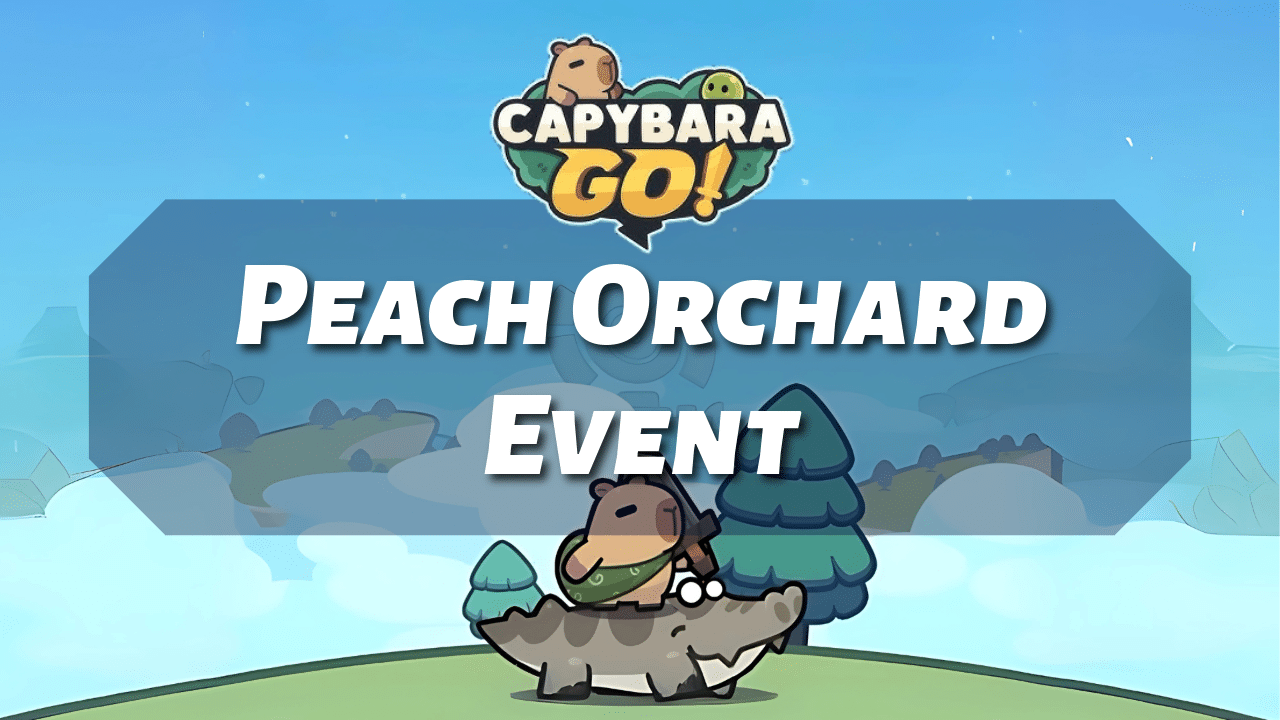
Introduction to the Peach Orchard Event
The Capybara Go Peach Orchard Event is designed to challenge players to grow and sell peaches and other fruits at the highest possible price in order to earn tickets. The event revolves around planting seeds, nurturing them as they grow, and harvesting the fully matured fruits. Once harvested, players can sell their produce, with higher prices leading to more tickets earned. The event encourages strategic decision-making, as timing plays a crucial role in maximizing profits.
This event follows a structure commonly seen in other farming or trading events where players cultivate resources and exchange them for in-game currency or rewards. Success in the event depends on efficient crop management, careful planning, and seizing opportunities to sell at peak prices. Players must also balance the time it takes for crops to grow with the need to sell quickly and reinvest in new seeds. With the right strategy, participants can maximize their earnings and climb the leaderboard.
Getting Started – Planting Seeds
To begin growing fruits in the Peach Orchard Event, players need to obtain seeds, which can be acquired through missions or by purchasing them in special packages. Some seeds may also be given as rewards through daily logins or by opening chests obtained from event-related tasks. These seeds are essential for progressing in the event, as they are the starting point for harvesting and selling fruits to earn tickets. Players should regularly check for opportunities to collect seeds to ensure a continuous cycle of planting and harvesting. Proper seed management can help maximize the number of fruits grown during the event.
The field consists of 16 slots where seeds can be planted, allowing players to grow multiple crops at once. Players can plant seeds manually, placing them one by one, or use the auto-plant feature to speed up the process. The choice between manual and automatic planting depends on individual preferences, as both methods work effectively. While there is no strict strategy for planting, maintaining a steady planting schedule ensures a constant supply of fruits for harvesting and selling. Being mindful of planting times and available seeds can help players make the most of their field and maximize their ticket earnings.
Growing and Accelerating Growth
Each fruit in the Peach Orchard Event has a different growth time, ranging from as short as 5 minutes to as long as 8 hours. The time required for maturation depends on the type of fruit, with some growing quickly while others take significantly longer. Managing these growth times effectively is crucial for maximizing productivity and ensuring a steady supply of fruits for selling. Since longer-growing fruits may yield higher rewards, players should plan their planting schedule accordingly to optimize their harvest cycles. Keeping track of growth times can help in making better decisions on when to plant and harvest for maximum efficiency.
Players can speed up the harvesting process using Dew Water, a special resource that accelerates fruit growth instantly. Dew Water is primarily obtained through missions and can be a valuable tool for reducing wait times, allowing players to harvest and sell their crops faster. Since Dew Water is a limited resource, it is best used strategically rather than on every fruit. Higher-value fruits, such as Xian and Ginseng, benefit the most from instant maturation, especially when selling prices are favorable. Using Dew Water at the right time can significantly increase ticket earnings by ensuring that premium fruits are ready for sale when prices peak.
While there is an auto-acceleration feature that automatically uses Dew Water, it is recommended to avoid enabling it. The feature does not have a confirmation prompt, meaning players might accidentally waste their Dew Water without realizing it. Since this resource is limited and valuable, manually choosing when and where to use it allows for better control over fruit growth and sales. Careful management of Dew Water ensures that it is used efficiently on rare or high-value crops, preventing unnecessary depletion. By planning growth acceleration wisely, players can maximize their harvest and increase their overall event earnings.
Harvesting
Once the growth timer for a fruit reaches zero, players can manually click on the fruit to harvest it. Harvesting is the final step in the growth cycle, allowing players to collect their crops and prepare them for sale. Timing the harvest correctly is important, as selling at the right moment can significantly impact ticket earnings. While fruits are ready for collection immediately after maturing, players should consider market conditions before selling them. Holding onto fruits strategically can lead to better profits if prices fluctuate favorably.
The auto-harvest feature automatically collects fruits, but it comes with a drawback. Any harvested fruits that are not sold immediately will be auto-sold after 24 hours at the player’s current price, rather than the highest available price among guildmates. This could result in missed opportunities to sell at a better rate. To maximize earnings, players can leave fruits unharvested until they find a more favorable price. This method ensures greater control over sales and prevents automatic transactions that might not be as profitable.
Selling Your Harvest
When selling fruits, players can click the sell button to view the current selling prices for the six available fruits. Each fruit’s price is influenced by its rarity, which is visually represented by its background color. Rarity levels range from white/gray (the lowest) to orange (the highest), with higher rarity fruits receiving better price multipliers. The rarity of a fruit directly affects its market value, making it important to recognize and prioritize high-rarity items for maximum profit. Understanding these multipliers helps players make informed decisions about when and where to sell their harvest.
The sell price of fruits changes every two hours in both a player’s shop and their guildmates’ shops. Rarity-based multipliers influence the price, with white/gray fruits selling at a reduced value (0.3 to 0.8 times the base price), green fruits offering no major increase (0.8 to 1), and blue fruits fetching between 1 to 1.5 times the base price. Purple fruits can sell for 1.5 to 2.5 times the base price, while the rarest orange fruits provide the highest return, selling for 2.5 to 3 times their value. Because prices fluctuate regularly, checking for better offers and waiting for the right moment to sell can significantly boost earnings.
Players also have the option to sell their fruits at their guildmates’ shops, potentially securing a better deal than their own shop offers. When selecting a fruit to sell, the game displays a list of available prices from guildmates, typically sorting the best offers at the top. However, only the top two guildmate prices are visible immediately, so it may be beneficial to check multiple options before finalizing a sale. Communicating with guildmates about good prices can help maximize profits, especially for high-value orange rarity fruits. Selling in another player’s shop does not negatively impact the seller, making it a useful strategy to take advantage of better market conditions.
If players do not manually sell their harvested fruits within 24 hours, the game will automatically sell them at the current price in their shop. This auto-sell feature does not necessarily guarantee the highest available price, meaning players might miss out on better deals. To avoid losing potential earnings, it is recommended to actively manage sales rather than relying on automatic transactions. Monitoring price changes and coordinating with guildmates ensures that fruits are sold at the most profitable rates. By staying proactive, players can maximize their ticket earnings and make the most of the event’s trading system.
Ticket System
The ticket system in the Peach Orchard Event determines the type and amount of tickets players receive when selling different fruits. The first four fruits—Longevity Peach, Purple Cloud Peach, Flat Peach, and Spiritual Fruit—typically provide silver tickets upon sale. These silver tickets serve as the standard currency in the event and can be used for various exchanges. The last two fruits, Immortal Fruit and Ginseng Fruit, usually grant gold tickets, which are more valuable and can be traded for better rewards. Since gold tickets are harder to obtain, selling high-value fruits at the best price is essential for maximizing returns.
Each fruit has a base ticket value before applying rarity multipliers. Longevity Peach and Purple Cloud Peach generally offer 225 silver tickets, while Flat Peach and Spiritual Fruit provide 675 silver tickets. Immortal Fruit grants 150 gold tickets, and Ginseng Fruit gives 450 gold tickets. The base ticket values are adjusted by the fruit’s rarity, with higher rarity levels significantly increasing the number of tickets received. Understanding these values helps players decide which fruits to prioritize when aiming for maximum ticket earnings.
Some fruits, such as the Shell Peach and Zion Peach, appear to have a fixed trade value of 50 silver tickets, likely referring to Longevity Peach and Purple Cloud Peach. Meanwhile, Flat Peach, Spiritual Fruit, and Ginseng Fruit tend to follow a set rate of 150 silver tickets before rarity multipliers are applied. These base ticket values suggest a structured system where specific fruits consistently yield predictable rewards. However, selling at higher rarity levels can greatly enhance these amounts, making it beneficial to harvest and sell at optimal times.
While base ticket values provide a guideline, some players have noticed discrepancies in actual sale prices, indicating possible bugs or incorrect tooltip information. There have been instances where the maximum ticket value for certain fruits exceeded the expected amount, particularly at legendary rarity levels. This suggests that the in-game multipliers might be functioning differently than stated. Since legendary rarities can exceed the standard 2.5x multiplier, players should remain attentive to price fluctuations and take advantage of any opportunities for increased earnings. Managing sales effectively ensures that players make the most of their ticket gains throughout the event.
Maximizing Your Ticket Earnings
To maximize ticket earnings in the Peach Orchard Event, players should check their shop and guildmate shops regularly, as sell prices update every two hours. Since different shops may offer better prices for the same fruit, selling at a guildmate’s shop instead of your own can lead to higher profits. Frequent price checks ensure that players can take advantage of the best available rates before prices change again. Keeping track of price trends over time can also help in predicting the best selling opportunities. A consistent approach to monitoring prices allows players to make informed decisions and maximize their ticket earnings.
Using Dew Water wisely is another key strategy for increasing ticket earnings. Instead of using it on common fruits, players should save Dew Water for higher-value fruits, especially those with blue, purple, or orange rarity. When a good selling price is available, instantly maturing these valuable fruits ensures they can be sold before prices drop. Since Dew Water is a limited resource, using it selectively on fruits that yield the highest ticket returns is the most efficient approach. Planning ahead and reserving Dew Water for crucial moments can significantly impact overall earnings.
Coordination with guildmates is essential for maximizing profits, as sharing information about high selling prices benefits everyone. If a player finds a shop with an excellent price, notifying guildmates allows them to sell their fruits at the best possible rate. Since selling in a guildmate’s shop does not negatively impact the seller, this teamwork ensures that everyone can take advantage of the highest prices available. Communication through guild chat or other in-game messaging systems can be useful for keeping track of price fluctuations. Working together makes it easier to secure better deals and earn more tickets throughout the event.
If the current selling prices are not favorable, players can refresh their shop to try for better rates. Each day, two free refreshes are available through watching ads, and additional refreshes can be done using refresh tickets. To maximize the effectiveness of shop refreshes, it is best to use them strategically, preferably around two hours and five minutes before the next price reset. This timing allows players to have the longest possible window to sell at improved prices before the shop updates again. Proper use of shop refreshes can lead to higher profits and more efficient ticket collection over the course of the event.
Key Event Items
Several key items in the Peach Orchard Event help players optimize their fruit-growing and selling process. One of the most important resources is Dew Water, which allows players to instantly mature seeds without waiting for the normal growth time. Dew Water is obtained through missions and should be used strategically rather than wasted on low-value fruits. Since higher-rarity fruits provide better ticket returns, saving Dew Water for blue, purple, or orange rarity fruits can significantly increase earnings. Timing its use when good selling prices are available ensures that players maximize their profits while efficiently managing their resources.
Refresh Tickets are another valuable item that allows players to refresh their shop prices. Since fruit prices change every two hours, using Refresh Tickets can help secure better deals if the current prices are not favorable. Players can also receive two free refreshes daily by watching ads, providing an opportunity to improve their selling rates without spending additional resources. Refreshing the shop too early may result in missing out on better prices later, so it is best to time these refreshes carefully. Proper use of Refresh Tickets can make a significant difference in overall earnings, ensuring that fruits are sold at the highest possible rates.
Items to Consider Carefully
Certain items in the Peach Orchard Event may seem valuable at first glance but should be carefully considered before spending tickets. The Phoenix Wing Purple Gold Crown appears to be a cosmetic hat rather than a functional game item. Players who purchased it by mistake have found it in the skins or hat section, meaning it does not provide any gameplay advantages. If the goal is to maximize performance in the event, it may be better to save tickets for items that offer tangible benefits. While cosmetics can be appealing, prioritizing useful event rewards is the smarter approach.
Artifacts, such as the Phoenix Wing Purple Gold Crown and other items like the Xing Tian Axe, Pan Gu Axe and Zhanxian Flying knife, are available for exchange in the event shop. While the Phoenix Wing has a unique design, artifacts may hold greater value since they are limited-time items and might not return for a while. The Skill Axe, for example, could be useful for switching between different builds, such as Whisperer. If resources allow, players may want to obtain at least one of each artifact for testing to determine their effectiveness in different playstyles. Prioritizing artifacts over purely cosmetic items can provide more long-term benefits in the game.
To optimize ticket earnings and resource management, players should avoid using auto-acceleration and auto-harvest features. Auto-acceleration can quickly consume Dew Water without confirmation, potentially wasting it on low-value fruits instead of reserving it for high-rarity ones. Similarly, auto-harvest collects all ripe fruits automatically, which can lead to them being auto-sold at lower prices if not manually managed. By taking a more strategic approach to harvesting and accelerating growth, players can ensure they get the best possible return on their efforts. Careful decision-making throughout the event will lead to better rewards and a more efficient use of resources.
Event Exchange
The event exchange allows players to trade silver tickets for gold tickets, but this should be done with careful consideration. While it may seem like a convenient way to obtain gold tickets, most high-value prizes in the event require a significant number of them, often ranging from 8,000 to 18,000 gold tickets. Additionally, there is a cap on how many gold tickets can be purchased with silver tickets, typically limited to 100 at a time and only a handful of times per event.
Because of these restrictions, converting silver tickets to gold might not be the most efficient strategy unless a player is only slightly short of gold tickets near the end of the event. It is generally better to prioritize earning gold tickets through high-value fruit sales rather than relying on exchanges.
The exchange shop contains a variety of items that players can redeem with their tickets. Among these are limited-time artifacts such as the Skill Axe, which can be beneficial for different builds. Artifacts are often a better investment than cosmetic items, as they provide functional advantages in gameplay. Players should review the available rewards and plan their ticket spending accordingly to maximize their event benefits. Since these artifacts may not be available again for a while, securing them before the event ends is a wise decision.
Aside from artifacts, the exchange shop also includes chests and hero upgrade materials, which can be valuable for strengthening characters. These items can help players improve their overall progression in the game, making them a solid choice for those looking to enhance their long-term performance. Choosing between artifacts, chests, and upgrade materials depends on individual player needs, but all offer useful benefits beyond the event. Careful planning ensures that players make the most of their earned tickets and don’t miss out on valuable rewards.
Even after the event officially ends, there are usually a few extra days to finalize exchanges. This grace period allows players to use any remaining tickets they have collected without worrying about missing out on rewards. It is a good opportunity to make any last-minute exchanges, especially for those who may have been undecided about certain items. Players should keep track of this extended period to ensure they don’t waste any of their hard-earned tickets. Properly managing exchanges can make a significant difference in the overall value gained from the event.
Ranking Rewards
The Peach Orchard Event features ranking rewards that offer valuable prizes based on a player’s performance throughout the event. Players who earn the most tickets—whether silver or gold—can secure higher placements on the leaderboard. Ranking rewards typically include gems, which are a crucial currency in the game and can be used for various upgrades, summons, or purchases. The higher a player’s rank, the better the rewards they receive, making it worthwhile to maximize ticket earnings through strategic planting, harvesting, and selling. Since competition can be tough, staying active throughout the event and keeping an eye on rankings can help secure a better position.
To improve ranking, players should focus on growing high-value fruits, selling them at optimal prices, and using resources like Dew Water efficiently. Coordinating with guildmates to find the best prices for selling can provide an advantage, as well as properly timing shop refreshes to ensure maximum ticket earnings. While casual participation can still yield rewards, those aiming for top ranks may need to be more aggressive in managing their crops and exchanges.
Since ranking rewards are only distributed at the end of the event, players should make a final push in the last days to secure a strong position. Planning ahead and maintaining a steady strategy throughout the event can make a significant difference in final rankings and the rewards earned.
Missions
Daily missions play an essential role in the Peach Orchard Event, providing a steady supply of resources such as seeds, Dew Water, and tickets. These missions typically involve simple tasks like participating in raids, competing in the arena, logging in daily, and opening chests. Completing them consistently ensures that players have enough seeds to plant and harvest, along with the necessary resources to speed up growth and maximize ticket earnings. Since missions refresh daily, it’s important to complete them before the reset to avoid missing out on rewards. Even players who don’t spend a lot of time in the event can make meaningful progress by keeping up with daily tasks.
Some missions may offer better rewards than others, making it beneficial to prioritize tasks that yield more valuable items like Dew Water or gold tickets. Checking the mission list at the start of each day helps with planning and ensures no rewards go unclaimed. In addition to daily tasks, there may also be long-term event missions that reward extra tickets or special items for reaching specific milestones. These could involve selling a certain number of fruits, using Dew Water strategically, or reaching a set ticket threshold. Keeping track of both daily and overall event missions can significantly boost a player’s progress and make it easier to obtain high-value rewards.
While most missions are straightforward, some may require a bit more effort, such as competing in PvP battles or completing dungeon raids. These tasks not only contribute to event progression but also provide additional benefits for overall gameplay. Players who engage in these activities regularly will find themselves with a steady flow of event rewards without needing to spend extra resources. Since missions are a reliable way to earn seeds and tickets, consistently completing them can make a big difference in overall event success. Those who take full advantage of daily and event missions will have a better chance at ranking higher and securing the best rewards available.
Shop Refresh Timing
The shop refreshes every two hours, giving players new selling prices for their fruits. Since all guildmates share the same refresh timing, it is helpful to coordinate with them to identify the best prices available. Checking the shop frequently ensures that players can sell their harvest at the most profitable rates instead of settling for lower offers. Since prices fluctuate with each refresh, it is beneficial to compare options across different shops before making a sale. Timing your sales around refreshes can make a significant difference in maximizing ticket earnings.
A key strategy is to plan a final refresh about two hours and five minutes before the daily reset. This allows players to see the last available prices before the auto-sell feature takes effect. If prices are low at that time, waiting for the next refresh may not be an option, so it’s best to sell at the highest rate available. Players who track pricing patterns throughout the day can anticipate when the best selling opportunities might occur. Being mindful of refresh cycles and auto-sell mechanics helps ensure that fruits are sold for the best possible returns.
Auto-Sell After 24 Hours
Any harvested but unsold fruits will be automatically sold after 24 hours at the current listed price. This means that if players do not manually sell their crops before the time limit, they may miss out on potential higher prices from later shop refreshes. The auto-sell happens at the start of a new day or during the daily reset, ensuring that no harvested fruits remain in storage beyond the 24-hour window. To maximize profits, players should monitor selling prices closely and aim to sell at the highest possible rate before the auto-sell takes effect.
Since the auto-sell does not necessarily guarantee the best price, it is important to plan ahead and take advantage of shop refreshes. If the prices are low near the end of the 24-hour period, players should consider selling manually rather than waiting and risking a poor return. Those who keep track of refresh cycles and coordinate with guildmates for better prices will have a better chance of maximizing their ticket earnings. Proper timing and active management of sales can make a significant difference in overall rewards from the event.
Key Takeaways for Success
To maximize your rewards in the Peach Orchard Event, focus on selling your fruits at the highest possible prices. The background color of the price indicates its value, with orange representing the most valuable rates. Since prices refresh every two hours, selling at a good price when you see it is crucial, as waiting too long may result in lower offers later. Monitoring shop prices frequently ensures you get the best deal before the auto-sell feature kicks in after 24 hours.
Utilizing your guild is essential for maximizing profits. Selling to guildmates allows you to access potentially better prices than those in your own shop. Communicating with your guildmates about high prices can help everyone get the best possible returns. Since only the top two prices from guildmates are visible, checking frequently and coordinating sales can make a significant difference.
Dew Water is a valuable resource and should be saved for higher-value fruits like Immortal and Ginseng. Using it strategically when you see a high selling price allows you to instantly mature these fruits for immediate sale. Avoid using the auto-acceleration feature to prevent accidental usage of Dew Water, ensuring it is only spent when it benefits your earnings the most.
Auto-harvest and auto-acceleration can reduce your control over selling prices and resource management. Since harvested fruits will be auto-sold after 24 hours at their current price, manually managing when to harvest and sell can help optimize your ticket earnings. Keeping an eye on refresh cycles and using free refreshes or refresh tickets wisely can also improve your profits.
Understanding the ticket system is key to obtaining the best rewards. Silver tickets come primarily from the first four fruits, while gold tickets are earned from Immortal and Ginseng fruits. Gold tickets are required for high-value exchange items, so planning your exchanges carefully is important. Prioritize limited-time artifacts and be mindful of price fluctuations in the exchange shop. By staying informed, coordinating with your guild, and making strategic selling decisions, you can maximize your earnings and get the most out of the event.













